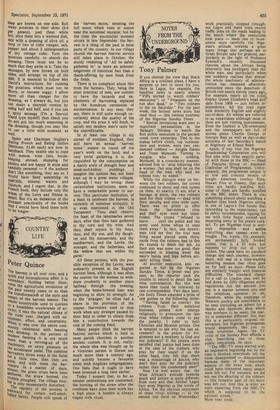COUNTRY LIFE
peter Quince
The harvest is all over now, and a i quick and inconspicuous affair it s nowadays. Nothing better illustrates the agricultural revolution of the past twenty years or so than the transformatioh of the style and tempo of the harvest season, The Whole countryside used to quicken to a breathless accelerando of activity; it was the natural climax of the rural year, charged with excitement, effort, and uncertainty. When it was over the entire community celebrated with feasting arkd drinking. In the pattern of Modern farming it is not much More than a revving-up of the Machinery, an extra pressure on the accelerator pedal. The combine harvesters drone away in the fields for a little time, then they are gone, and with them the harvesters. In a matter of days, almost, the grain crops have been gathered, the straw burned, the stubble ploughed. The village routine is only momentarily disturbed. The rapidity of the process is awkward for certain well-estab
, "shed habits. People still speak of the 'harvest moon,' meaning the full moon which rises at sunset near the autumnal equinox; but by the time the equinoctial moment occurs in late September, the harvest is a thing of the past in most parts of the country. In our village church the harvest festival service still takes place in October; the sturdy rendering of 'All be safely gathered in' is more an acknowledgement of historical fact than a thank-offering by men fresh from the fields.
There is no complaint about this from the farmers. They, being the most practical of men, are content to have the hazards and excitements of harvesting replaced by the humdrum certainties of mechanisation. In any case, they say, there is still quite enough uncertainty about the quality of the crop, and the price it will fetch, to satisfy any modern man's taste for the unpredictable.
In at least one village in my corner of southern England, they still •have an annual 'harvest home' supper to round off the year's work on the land; and a very jovial gathering it is, distinguished by the consumption on a manly scale of draught beer and steak-and-kidney puddings. I imagine the custom has not been kept up in a great many villages, although I may be wrong: these unvarnished institutions seem to have a remarkable power to survive. This particular institution, of a feast to celebrate the harvest, is certainly of immense antiquity. It is even mentioned in the Old Testament: 'Thou shalt observe the feast of the tabernacles seven days, after that thou hast gathered in thy corn and thy wine. And thou shalt rejoice in thy feast, thou, and thy son, and thy daughter and thy manservant, and thy maidservant, and the Levite, the stranger, and the fatherless, and the widow that are within thy gates.'
All these persons, with the possible exception of the Levite, were ordinarily present at the English harvest feast, although it was often the custom for the women to withdraw prudently to another place halfway through the evening, when the home-brewed beer was beginning to show its strength. As to the ' stranger,' he often had a share in the provision of the supper. Harvesters used to stop work when any stranger passed by their field in order to obtain from him a contribution towards the cos/ of the coming feast.
Many people think the harvest festival service which is held in most parish churches is another ancient custom. It is not, really: the whole idea was thought up by a Victorian parson in Dorset not much more than a century ago, and quickly became a favourite event with Anglican congregations. One feels that it ought to have been invented a long time earlier, Today I suspect that, so far as secular celebrations are concerned, the burning of the straw after the combines have done their work has a high place. A bonfire is always tinged with ritual.


































 Previous page
Previous page